|
|
|
Sort Order |
|
|
|
Items / Page
|
|
|
|
|
|
|
| Srl | Item |
| 1 |
ID:
096499
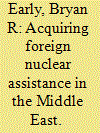

|
|
|
|
|
| Publication |
2010.
|
| Summary/Abstract |
The United Arab Emirates (UAE) has laid out an ambitious plan to become the first Arab country to possess a civilian nuclear energy program. Central to that effort has been the Emirati government's ability to obtain foreign nuclear assistance. This article traces the UAE's strategies for overcoming the obstacles that stood in the way of nuclear suppliers providing assistance. It examines the approach taken by the UAE to assuage the safety and security concerns of nuclear suppliers, how the UAE leveraged its alliances with France and the United States to obtain their cooperation, and its strategies for engaging domestic interest groups in supplier states. The generalizable elements of the UAE's strategies are discussed and used to provide insight into the prospects for other Middle Eastern states' bids to obtain similar assistance. The article concludes with a discussion of the potentially transformative aspects of the strategies employed by the UAE in shaping other countries' pursuit of nuclear energy in the region.
|
|
|
|
|
|
|
|
|
|
|
|
|
|
|
|
| 2 |
ID:
107569


|
|
|
|
|
| Publication |
2011.
|
| Summary/Abstract |
The Biological Weapons Convention (BWC) has continued along a path of slow evolution since the 2001 collapse of negotiations for a verification protocol for the treaty. Over the last ten years, two intersessional programs of work, along with the Sixth BWC Review Conference, have resulted in the establishment of practices and institutions that strengthen treaty implementation mechanisms. In addition, developments external to the BWC-such as the revitalization of the UN secretary-general's investigation mechanism-have increased the range of mechanisms available to states to address challenges posed by biological weapons. The authors argue that incremental enhancements to the BWC offer the best route forward for the treaty and for the wider biological weapons prohibition regime. The authors identify short-, medium-, and longer-term proposals for such enhancements.
|
|
|
|
|
|
|
|
|
|
|
|
|
|
|
|
| 3 |
ID:
143165
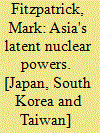

|
|
|
|
|
| Publication |
London, IISS, 2016.
|
| Description |
175p.pbk
|
| Series |
Adelphi Paper Series; 455
|
| Standard Number |
9781138930803
|
|
|
|
|
|
|
|
|
|
|
|
Copies: C:1/I:0,R:0,Q:0
Circulation
| Accession# | Call# | Current Location | Status | Policy | Location |
| 058442 | 327.1747/FIT 058442 | Main | On Shelf | General | |
|
|
|
|
| 4 |
ID:
096502
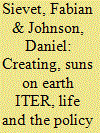

|
|
|
|
|
| Publication |
2010.
|
| Summary/Abstract |
Concerns about climate change and energy security have prompted some countries to revive dormant nuclear fission power programs to meet growing energy demands and reduce carbon dioxide emissions. However, this so-called nuclear renaissance based on fission would have major drawbacks in the areas of safety, security, and nonproliferation. Nuclear fusion, however, is portrayed by its proponents as mitigating these drawbacks, and scientists continue to pursue fusion's promise with two large-scale projects: the International Thermonuclear Experimental Reactor (ITER), and the Laser Inertial Fusion Engine (LIFE) reactor. Although supporters often hail fusion as proliferation resistant, the technology could be used to create weapons-usable fissile material. This article explains how fissile material could be created in ITER or LIFE and analyzes other nonproliferation implications of fusion; the authors discuss the various challenges faced by ITER and LIFE.
|
|
|
|
|
|
|
|
|
|
|
|
|
|
|
|
| 5 |
ID:
092920
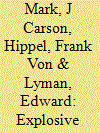

|
|
|
|
|
| Publication |
2009.
|
| Summary/Abstract |
The following discussion focuses on the question of whether a terrorist organization or a threshold state could make use of plutonium recovered from light-water-reactor fuel to construct a nuclear explosive device having a significantly damaging yield. Questions persist in some nonproliferation policy circles as to whether a bomb could be made from reactor-grade plutonium of high burn-up, and if so, whether the task would be too difficult for a threshold state or terrorist group to consider. Although the information relevant to these questions is in the public domain, and has been for a considerable time, it is assembled here for use by policy makers and members of the public who are concerned about preventing the spread of nuclear explosives.
|
|
|
|
|
|
|
|
|
|
|
|
|
|
|
|
| 6 |
ID:
006538


|
|
|
|
|
| Publication |
Washington, D.C., Office of Technology Assessment, 1993.
|
| Description |
181p.
|
|
|
|
|
|
|
|
|
|
|
|
Copies: C:1/I:0,R:0,Q:0
Circulation
| Accession# | Call# | Current Location | Status | Policy | Location |
| 038127 | 382.64/EXP 038127 | Main | On Shelf | General | |
|
|
|
|
| 7 |
ID:
130263
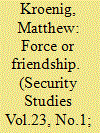

|
|
|
|
|
| Publication |
2014.
|
| Summary/Abstract |
Why do great powers take such different approaches to the issue of nuclear proliferation? Why do states oppose nuclear proliferation more vigorously in some cases than in others? In short, what explains great power nonproliferation policy? To answer these questions, this article tests two competing theories of nonproliferation policy. The first, political relationship theory, suggests that states oppose nuclear proliferation to their enemies but are less concerned when friends acquire nuclear weapons. The second, power-projection theory, argues that states oppose the spread of nuclear weapons to states over which they have the ability to project military power because nuclear proliferation in those situations would constrain their military freedom of action. In contrast, states will be less likely to resist, and more likely to promote, nuclear proliferation to states against which they cannot use force. To test these hypotheses, this article uses evidence from great power nonproliferation policy from 1945 to 2000. While both theories find some support, the power-projection theory performs significantly better. The findings of this article have important implications for international relations theory and US nonproliferation policy.
|
|
|
|
|
|
|
|
|
|
|
|
|
|
|
|
| 8 |
ID:
102383
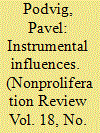

|
|
|
|
|
| Publication |
2011.
|
| Summary/Abstract |
The 2010 Nuclear Posture Review (NPR) conducted by the United States has become an important element of the US-Russian relationship, for the policies set during the review process directly affect Russian officials' perceptions of their security environment and provide a framework for the domestic debate on security issues. From Moscow's point of view, the most important outcome of the NPR process was the resumption of the bilateral arms control negotiations and the US willingness to work with Russia to resolve the dispute about missile defense. These developments helped strengthen the domestic institutions in Russia that support a cooperative US-Russian agenda, securing Russia's cooperation with the United States on a range of nonproliferation issues. Additionally, the renewed US commitment to nuclear nonproliferation, disarmament, and reduced reliance on nuclear weapons has apparently had an effect on the new Russian military doctrine, which somewhat reduces the role of nuclear weapons in Russian national security policy.
|
|
|
|
|
|
|
|
|
|
|
|
|
|
|
|
| 9 |
ID:
105208
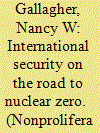

|
|
|
| 10 |
ID:
140916


|
|
|
|
|
| Summary/Abstract |
How has the United States behaved historically toward friendly states with nuclear weapons ambitions? Recent scholarship has demonstrated the great lengths to which the United States went to prevent Taiwan, South Korea, and West Germany from acquiring nuclear weapons. Yet seemingly on the other side of the ledger are cases such as Israel, South Africa, and Pakistan, where the United States failed to prevent proliferation, and where many have argued that the United States made exceptions to its nonproliferation objectives given conflicting geopolitical goals. A reexamination of the history of U.S. nonproliferation policy toward Israel, South Africa, and Pakistan, based on declassified documents and interviews, finds that these cases are not as exceptional as is commonly understood. In each case, the United States sought to prevent these states from acquiring nuclear weapons, despite geopolitical constraints. Moreover, once U.S. policymakers realized that prior efforts had failed, they continued to pursue nonproliferation objectives, brokering deals to prevent nuclear tests, public declaration of capabilities, weaponization, or transfer of nuclear materials to other states.
|
|
|
|
|
|
|
|
|
|
|
|
|
|
|
|
| 11 |
ID:
123549


|
|
|
|
|
|
|
|